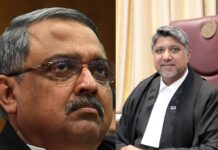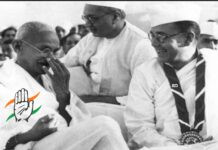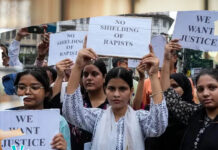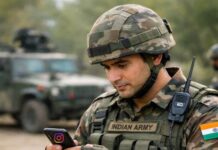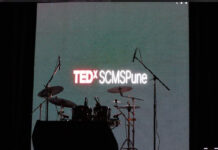By Anirudh Kashi
“I always believed there were two kinds of men in this world, men who go to their deaths screaming, and men who go to their deaths in silence. Then I met the third kind.” -Mr. Mchenely, Jailer.
On the 23rd of March, 1931 India lost three of her bravest men. With shouts of “Inquilab Zindabad” these men, whose bravery knew no bounds have lived on in the hearts of those few people who have taken up their cause.
Bhagat Singh, the man who murdered a British police officer; threw bombs inside the Central Legislative Assembly; fasted for 116 days in jail; but lived a mere 23 years. He was born into a Sikh family on 28 September, 1907. At the age of 12, he visited the Jallianwala Bagh hours after the bloody massacre in which thousands of innocent people, including women and children were shot to death. At the age of 14 he was actively taking part in protests. When his marriage was arranged, he ran away from home and in the note left behind he had said, “My life has been dedicated to the noblest cause, that of the freedom of the country. Therefore there is no rest or worldly desire that can lure me now.”
Later on he joined the Hindustan Republican Association, whose members included the other great contemporary revolutionaries- Ramprasad Bismil, Chandrashekhar Azad and Ashfaqulla Khan. By Singh’s insistence the name of the organization was changed to the Hindustan Socialist Republican Association.
In the year 1928 a protest led by Lala Lajpat Rai was held against the Simon Commission. In the lathi charge against the peaceful protesters Lala Lajpat Rai was fatally wounded and he became a martyr. To avenge his death Rajguru, Bhagat Singh and Sukhdev plotted to kill James A Scott, the officer who ordered the lathi charge. Unfortunately, Officer Saunders was murdered by these men. Remember, this was the era of the British raj there were strict laws against Indians possessing weapons and hardly any Indian had taken to weapons to drive the tyrants out. It took a tremendous amount of conviction to take the path of revolution when the country was engulfed in the ideal of non- violence.
In reaction to the Defence of India Act, 1915 Bhagat Singh and Batukeshwar Dutt threw two bombs in the Central Legislative Assembly. It didn’t kill anyone but injured some members. When the hall was filled with smoke, they threw pomp plates and shouted “Inquilab Zindabad”. It was a direct attack on the British Raj. The empire was shaken, and the fear stricken British started to panic and a hasty trail ensured. It takes incalculable amount of courage to attack the core of the administrative structure in such a dreadful manner.
In prison Bhagat Singh and his comrades fasted for 116 days, surviving only on air and water, the latter being denied at times. The authorities’ desperate attempt to break there fast was futile. They would fill the pitchers with milk instead of water, leaving the prisoners a difficult choice between death and breaking their conviction. At least that is what the government thought, but for these men, breaking a conviction or deviating from their ideals was the same as death. One man died, for his body couldn’t keep up with the sprit. Singh lost 6.4kg from 60kg before the strike. Their demands: to be treated as political prisoners, with proper standard of living conditions and access to books among other things. Man cannot survive for 116 day( about 4 months) without food if his conviction is weak.
It is said that at one particular point in history Bhagat Singh’s popularity rivaled even that of Gandhi’s. After Bhagat Singh and two of his associates were sentenced to death, Gandhi and Irwin met to discuss a pact by which Gandhi was to repeal his Non- Cooperation movement and the government was to release 90000 political prisoners. As per the notes of Lord Irwin-
“While returning Gandhiji asked me if he could talk about the case of Bhagat Singh, because newspapers had come out with the news of his slated hanging on March 24th. It would be a very unfortunate day because on that day the new president of the Congress had to reach Karachi and there would be a lot of hot discussion. I explained to him that I had given a very careful thought to it but I did not find any basis to convince myself to commute the sentence. It appeared he found my reasoning weighty.”
And thus on the 23rd of March, 1931 Bhagat Singh, Shivram Rajguru and Sukhdev became one of the bravest men India had ever since and yet to see. With the help of these great revolutionaries India got her freedom 16 years later. In reaction to the hanging Gandhi wrote thus,
“Bhagat Singh did not wish to live. He refused to apologise, or even file an appeal. Bhagat Singh was not a devotee of non-violence, but he did not subscribe to the religion of violence. He took to violence due to helplessness and to defend his homeland. In his last letter, Bhagat Singh wrote, ” I have been arrested while waging a war. For me there can be no gallows. Put me into the mouth of a cannon and blow me off.” These heroes had conquered the fear of death. Let us bow to them a thousand times for their heroism.”
Today India is in need of such men, men who have conquered fear himself. I urge the youth of India to uphold Bhagat Singh’s legacy. If that is too much to ask, at least remember these brave men. It is a saddening fact that most of the school children today, know but a little about these brave men. These men sacrificed everything for the sake of the nation, for the sake of the “unborn children of India”. Now these children are born and thanks to their efforts we live in a free India. Hardly will we be able to comprehend the suffering of the people during the raj. It is our responsibility today, to build the glorious India they dreamed of, and not merely stand and watch as the country is deteriorating slowly. Let us all hope that their sacrifices does not go in vain!





